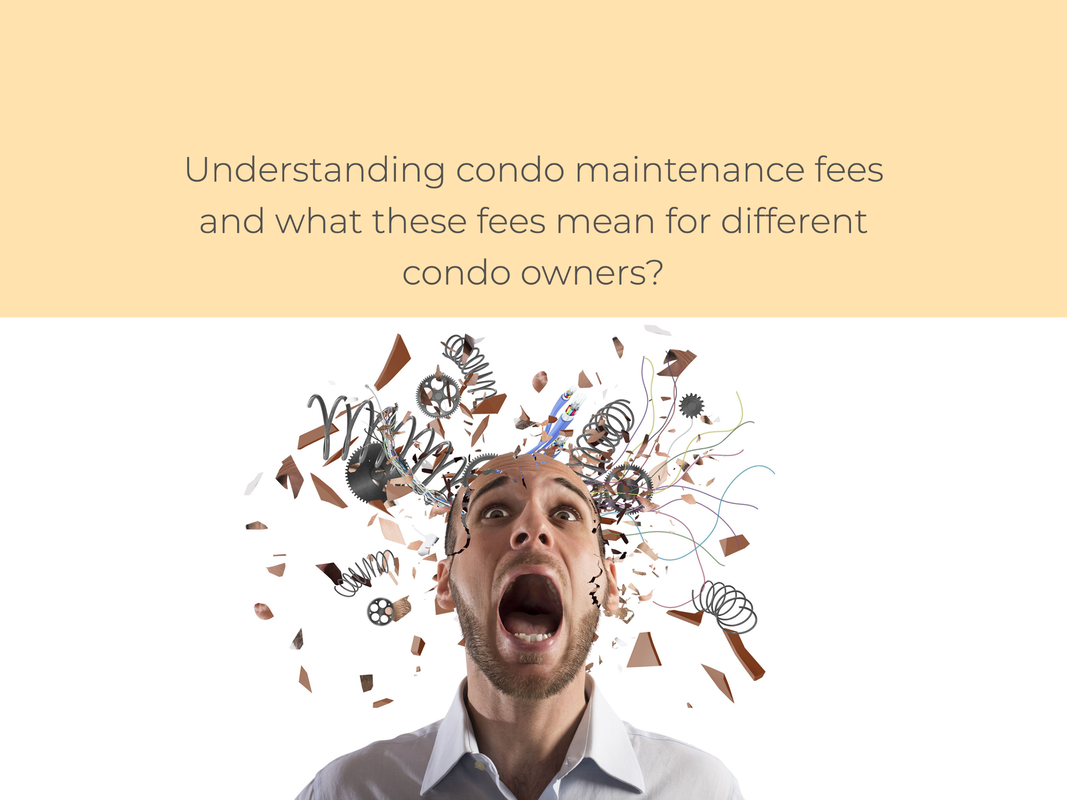|
The condo maintenance fee structure can be complex because many underlying details need to be looked at to make sense of it. There is no easy comparison among condos. It is somewhat similar to buying a car. The price of a medium-size family car can range from 25 to over 100 thousand dollars. How do you go about comparing these cars to account for such a price gap? The car manufacturers list all the options, extras, and advantages such as luxury items, safety features, horsepower, and brand to explain the suggested price tag. Similarly, condo buyers should list each condo's advantages, options, and amenities for an accurate comparison. It depends on what you want from the condo you will own in the future. Some buyers may consider the lower end of condo fees, such as an investor whose goal is to rent the unit or a young buyer with minimal needs. Yet, some buyers are looking for the advantages that a condo can offer and are difficult to replicate in a traditional house. These buyers have done their due diligence, and it is cost-effective for them to pay extra for condo ownership and condo maintenance fee. In this article, I will break down the components of the condo maintenance fee and its relationship to individual needs. You should carefully study and compare condos using the guide provided here to discover what condo and condo fee combinations work for you and your family. If you are an investor, you want the lowest condo fee since you want the most return on your investment. Experienced investors understand that condo fees may increase more than they like. Hence investors are selective and careful with the type of condos they purchase. For example, some new condo buildings and sometimes older buildings maintain lower condo fees for the time being to increase the condo prices and sell them faster. Only after a few months or years, to owners' surprise, condo fees are raised to an amount that should have been from the beginning. For a retired couple and some others, condo life provides the lock-and-go opportunity. They would not mind paying more for condo fees to benefit from extra security and peace of mind. I know many families with children prefer condos because of the amenities like swimming pool and exercise rooms. Having such amenities at an elevator-ride distance can be a time, hassle, and money-saving for busy parents. So condos with bigger, better amenities mean more expense for the overall condo, which is reflected in condo fees. For the most part, people are good at figuring out what is cost-effective. Depending on the family's needs, the higher condo fee is well justified since they know it will cost more time and money to acquire all the services provided by the condo community. It is worth mentioning that some condos offer security that can be extremely difficult to match for a homeowner, and people are willing to pay the premium condo fee for the extra safety. What is a condo fee? The condominium corporation runs the day-to-day operation, maintenance, and upgrades of the building and all the areas encompassing the building. The condominium corporation collects the condo fees to pay for all the expenses. You are solely responsible for all the expenses within your condo—for example, plumbing, electrical, and repairs. What is condo property management? The condominium corporation hires the property management company to run the many complex day-to-day operations. The property management is selected and employed by the board of directors. The property manager makes routine decisions; however, the more significant items land on the board of directors' approval process. What is the board of directors in a condominium? The board of directors is a group of condo owners that come together to select the property management company, make decisions on significant issues, propose a future plan for the condo, review expenses and decide on the condo maintenance fee amount. The condo owners elect the board of directors, which makes sense considering the level of authority. Generally, directors work as volunteers without any salary. Do all the board of directors make good and honest decisions regarding the condo? There is not much information or study, so it leaves much room for speculation. The good news is that the board members are subject to the Code of Ethics that they need to abide by. Through many years of experience in real estate and living in a condo, here is what I have learned. The qualification of board members varies greatly, which ultimately means (1) better money management, (2)adhering to rules and regulations equally by all condo owners, (3) timely repair and upgrades to enhance and add to the value, (4) maintaining a Reserve Fund balance in accordance of the future expenses (5) maintaining a community feeling in the building where everyone supports and respect everyone. Finally, a well-operated condo will have a fewer turnover with many permanent condo owners. Smart buyers will investigate all these signs mentioned above, which will give them a clear idea if the board of directors is competent at their tasks. The condo Status Certificate is an excellent initial source for such investigation. What is the Reserve Fund? The condominium corporation sets aside a certain amount of money for a major renovation, repair and replacements. A portion of the maintenance fee is dedicated to the reserve fund. Here is the list of most typical, but not all, items that reserve funds may be used.
What is the Status Certificate? The condominium corporation puts together a document (Status Certificate) providing many rules, regulations, insurance, and financial information about the condominium and condominium corporation. Anyone may request the condominium corporation's status certificate by giving a written request and a $100 fee. However, typically Status Certificate is requested by the condo owners who are selling their condo. The potential buyers or their lawyers review the Status Certificate to satisfy themselves if the condo is the right choice. Can the condo owner negotiate the condo fee? No, the board of directors determines the condo fee based on the current and estimated future expenses, which is not non-negotiable. Can the condo fee include in the mortgage and mortgage payment? No, the condo fee is the expense associated with the condo, such as hydro, water, maintenance and repair. It is not different from costs related to a house, except expenses are shared among the condo owners. Is the condo fee fixed? The short answer is no. The condo fees typically increase by a small percentage annually, reflecting the current and possible future inflation rate. The condo fees may increase at any time due to unexpected significant expenses such as major elevator repairs that can run up to a quarter to half a million dollars. The condo fees may increase dramatically if the fee is kept below the necessary amount intentionally for some time. The reason to keep the condo fees below a certain amount is to attract potential buyers and increase the value of the condos in general. The new condominium construction or other condos may utilize such a tactic. If you consider purchasing a condo, you should consult with a real estate lawyer, preferably specializing in the condo. Are older buildings prone to have higher condo fees? The short answer is no, despite the common and well-circulated belief. Such misinformation is understandable since the first look at the paper shows older condos generally have higher condo fees. Let's break it down to look at the possible reasons.
I hope the above explanations shed some light on the condo fee structure for the older and current buildings. Such bias may prevent many people from buying into an older condo that meets their needs. AuthorThe above Real Estate article was provided by David Khosravi, a leader in his field in North York, Willowdale Real Estate, Reach out to David via email: drdavidkg@gmail.com or by phone: 416.990.2424 Comments are closed.
|
Categories
All
AuthorDavid Khosravi |


